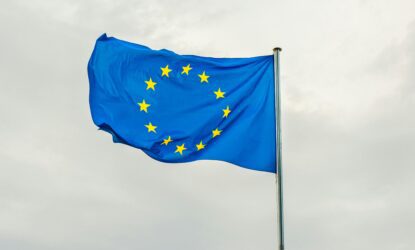 EcoVadis 2026: Your questions answered
EcoVadis 2026: Your questions answered
“Science-based targets are redefining business resilience—making credible climate action a strategic priority across the globe.”
The context
Why science-based targets raise the standard
Global climate action has reached a turning point. Average temperatures have surpassed 1.5°C for the first time, while extreme weather and economic disruption underline the urgency for robust climate action (1). This urgency not only calls for stringent global policy but also robust corporate strategies for decarbonisation. On this trajectory, companies face immediate supply chain and operational risks, stronger investor scrutiny, and new regulations.
The Science Based Targets Initiative (SBTi) is the most widely recognised global standard for setting corporate emissions reduction targets in line with the Paris Agreement (1). By enforcing rigorous criteria, SBTi ensures companies shift from mere carbon reduction ambitions to credible, science-driven climate action. Achieving SBTi validation means that organisations:
- Measure their carbon footprint annually and consistent with the GHG Protocol
- Set comprehensive targets covering all emissions scopes
- Place carbon reductions and sustainability at the heart of their business model
- Build trust through transparent reporting and robust carbon accounting
Through SBTi target setting, companies demonstrate climate accountability, meet evolving compliance demands, and build resilience for decades ahead (1).
What’s new: Evolving SBTi standards and expectations
2025 is seeing major updates to how targets are set, tracked, and maintained (2):
- Mandatory five-year reviews: All companies with validated SBTi targets will complete formal reviews every five years, ensuring continuous alignment with the latest science.
- Expanded public status categories: New dashboard statuses (‘active’, ‘updated’, ‘expired’, ‘archived’) will clarify organisations’ climate progress and discourage greenwashing.
- Sector-specific pathways: Enhanced requirements for high-emitting industries—including materials, consumer goods, and utilities — ensure that science-based target adoption tackles sector-wide decarbonisation.
- Supply chain and Scope 3 focus: Firms are asked to actively engage suppliers and partners, thereby contributing to the adoption of targets throughout value chains.
These shifts are pushing companies to treat decarbonisation as a strategic, enterprise-wide commitment—rather than isolated compliance exercises. SBTi’s expanded transparency and methodology help align current climate action with long-term decarbonisation need (2).
More curious about the latest changes to the SBTi? Red our blog article for the full picture.
SBTi trend tracker 2025: How businesses are leading
Drawing on global data from January 2024 to June 2025, the SBTi Trend Tracker 2025 maps out the rapid expansion of science-based climate target adoption (1):
- Nearly 11,000 companies worldwide have either validated SBTi targets or committed to do so covering over 40% of global market capitalisation and a quarter of global revenue.
- Companies with both near-term and net-zero targets have surged by 227% in just 18 months, marking the fastest growth ever seen in climate target adoption.
- Asia emerges as a growth engine: Led by China (a 228% increase in companies with targets), with similar momentum in Thailand, Japan, Taiwan, Hong Kong and Korea. This highlights Asia’s central role in embedding science-based targets throughout global supply chains.
- Sector leadership: Industrials, Consumer Discretionary, and Materials sectors are making the biggest moves. These businesses are responding to stakeholder expectation, moving carbon management and decarbonisation strategy centre-stage in operational and investment decisions.
- The share of global market capitalisation under science-based targets rose to 41% by end-2024, up from 39% in 2023 (1).
This mass adoption shows climate goals are now a core part of commercial strategy, not only a sustainability ambition.
Source: (1) SBTi Trend Tracker 2025. Science Based Targets Initiative. Available at: https://sciencebasedtargets.org/reports/sbti-trend-tracker-2025
Implications: Net-Zero strategy and resilience
The SBTi Tracker demonstrates how ambitious carbon reduction targets are becoming the starting point for competitive advantage. Organisations that align quickly:
- Engage suppliers in measurable carbon accounting and carbon footprint reduction
- Build resilience against regulatory and market risk
- Differentiate their brand as net-zero sustainability leaders
- Future-proof value creation in an era of transition risk and climate unpredictability (3)
Supply chains are also under greater scrutiny, untapped decarbonisation potential will increasingly drive collaboration, innovation, and reporting (1).
Expert support for decarbonisation and SBTi alignment
Nexio Projects is an international sustainability consultancy, supporting organisations from compliance to purpose with climate solutions built for measurable impact. As sustainability experts and net zero consultants, their team delivers SBTi-aligned strategy development, emissions reduction target-setting, ESG ratings, and comprehensive reporting.
Download our latest SBTi factsheet written by our climate experts.

With pragmatic, step-by-step support, Nexio Projects empowers clients to tackle decarbonisation and achieve net-zero goals.
Hear first hand from clients: Watch Nexio Projects’ collaboration with XD Connects on climate topics such as the SBTi.
Contact Nexio Projects for a free consultation call to discuss how science-based targets can transform your business performance.
Sign up for our newsletter for monthly updates and expert insights on carbon management and net-zero strategy.
References
- SBTi Trend Tracker 2025. Science Based Targets Initiative. Available at: https://sciencebasedtargets.org/reports/sbti-trend-tracker-2025
- SBTi releases new guidance for five-year target reviews and expanded status categories. Science Based Targets Initiative. 2025. Available at: https://sciencebasedtargets.org/blog/forging-the-next-chapter-sbti-releases-new-guidance-for-five-year-target-reviews-and-expanded-status-categories
- Number of Companies with Validated Net Zero Targets Triples. First Climate Markets. 2025. Available at: https://www.firstclimate.com/post/zahl-der-unternehmen-mit-validierten-klimazielen-verdreifacht-1?lang=en










